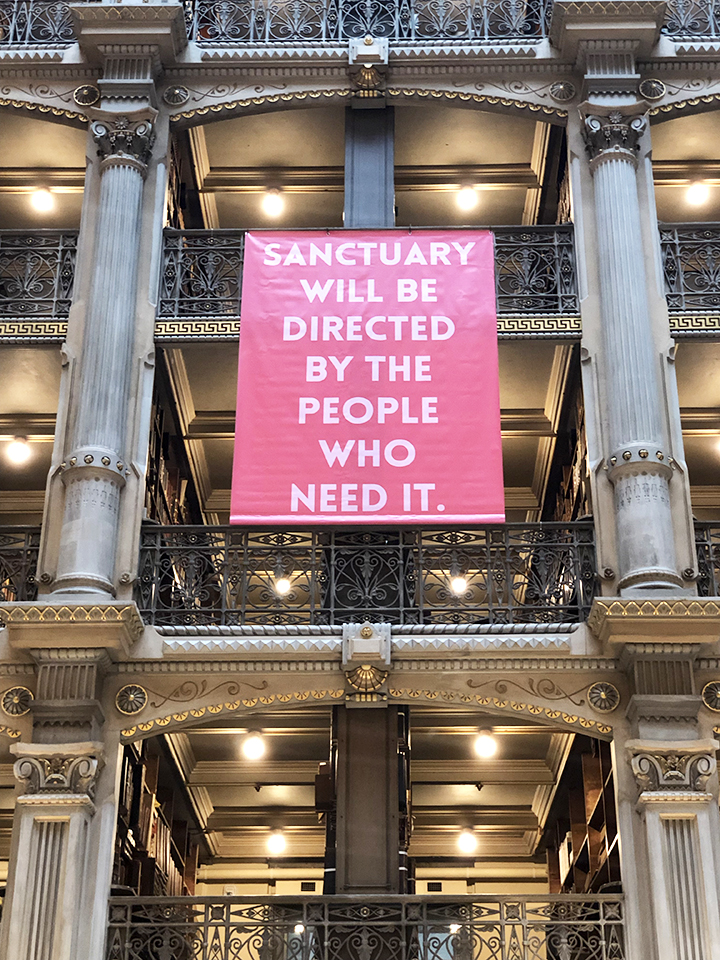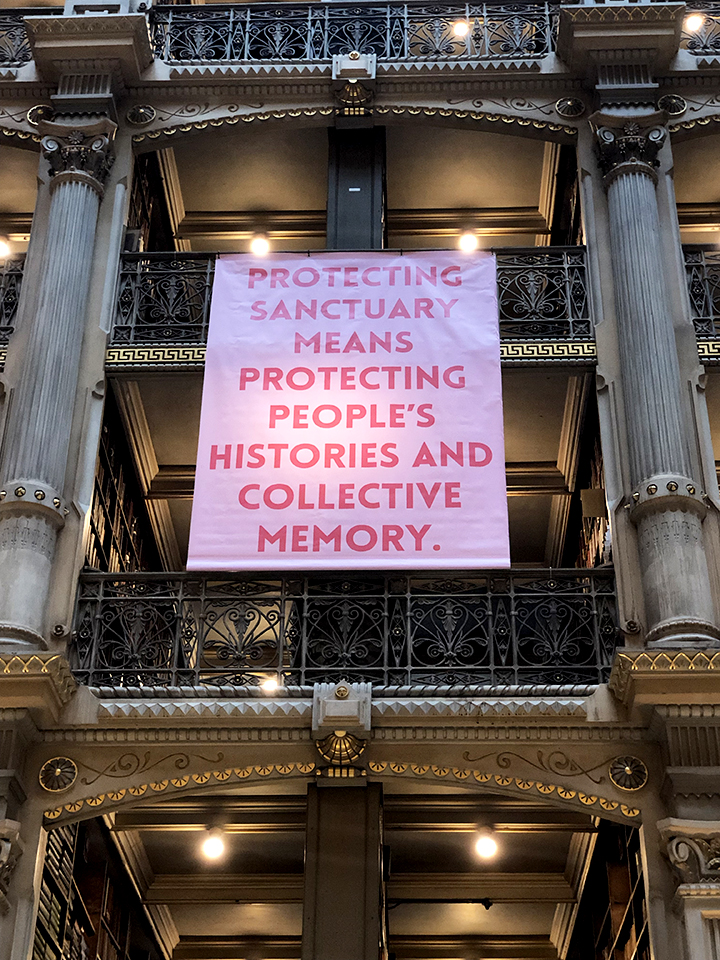A PRESS PRESS CHRONICLE
LOCATION
George Peabody Library
17 E Mt. Vernon Pl.
Baltimore, MD 21202
PROJECT RUN
1/3/2019 - 9/7/2019
PUBLIC HOURS
Tuesday - Thursday, 10am - 5pm
Friday, 10am - 3pm
Saturday, 10am - 1pm
and by appointment
OPENING RECEPTION
1/3/2019 7-10 pm
ACCESSIBILITY
Commune Diverge Shift Connect: A Press Press Chronicle is free and open to the public. The main level of George Peabody Library is wheelchair accessible via a ramp and a passenger elevator. The accessible entrance is available by ramp to the left of 17 E. Mount Vernon Place. The lighting in the library is a combination of LED lighting and natural daylight. We ask that visitors refrain from wearing fragrance. Please contact us with any questions.
The Institute for Expanded Research and the George Peabody Library present Commune Diverge Shift Connect: A Press Press Chronicle, a project by Press Press, an interdisciplinary publishing initiative and current artist-in-residence at the library.
Through this engagement, the library has acquired Press Press’s complete body of work and will support the production of a new publication that explores the nuances of their approach to publishing. A public display of the Press Press archive is on view at the library through September 7th.
Launched in 2014, Press Press is an interdisciplinary publishing initiative that aims to shift and deepen the understanding of voices, identities, and narratives that have been suppressed or misrepresented by the mainstream. Press Press was founded as an artist project by Kimi Hanauer and is produced through the collaborative involvement of Valentina Cabezas, Bomin Jeon, Bilphena Yahwon, as well as a network of family and friends who participate in and extend Press Press’s ongoing activities.
Press Press defines publishing as the action of gathering a public. Their approach places equal value on the relationships that develop between individuals and the communities involved in producing the resulting product, publication, or program. Through their experimentation with collaborative work, Press Press has attempted to create and refine an approach for cultivating ethical and compassionate frameworks of cooperation.
As Press Press enters into its fifth year of operation, the GPL Research Residency enables the team to reflect on its history and past projects, such as their long-term partnership with Baltimore City Community College Refugee Youth Project, If I Ruled The World, Sentiments: Expressions of Cultural Passage, and more. Through this process, and in collaboration with a broader community, Press Press aims to develop, collect, and share emergent models and methodologies for collective work that aid the efforts of cultural organizers.
This reflection also marks a year of transition for Press Press, as the team initiates a nomadic presence in Los Angeles, expanding their national reach. Through this work, Press Press ultimately aims to provoke the question: What are the conditions necessary for cultivating and sustaining ethical and compassionate frameworks for being with and cooperating with others in the world?
Press Press is an interdisciplinary publishing initiative established in 2014. Press Press's publishing practice is organized around two key goals; first, to shift and deepen the understanding of voices, identities, and narratives that have been suppressed or misrepresented by the mainstream, so far focusing on immigration and race in the United States; and second, to build networks of relationships through publishing practices centered on self-representation and gathering. Through an understanding of publishing as the act of gathering a public, Press Press’s streams of work include public cultural programming, an open-access publishing studio that’s based on an Exchange Economy, youth publishing workshops in an immigrant & refugee only space, and the ongoing production of print and digital publications. Press Press operates out of a storefront studio and library in Baltimore, MD and a production space in Los Angeles, CA.
The GPL Research Residency provides onsite workspace, project support, and access to the staff, collection, and resources of the George Peabody Library to support the research, development, and presentation of new work by artists, writers, poets, musicians, filmmakers, and other creative practitioners with a specific interest in engaging the collection, history, and space of the George Peabody Library. The GPL Research Residency was initiated in 2015 by Lu Zhang, artist and founder of IER, in collaboration with Paul Espinosa, the library’s books curator. After attending a lecture at the George Peabody Library, Lu approached Paul and asked for access to the collection in hopes of producing a new site-specific project. Supported by a Rubys Grant from The Robert W. Deutsch Foundation via the Greater Baltimore Cultural Alliance, the resulting project, topo(log) typo(log), is a series of six books documenting Lu’s yearlong studio residency at the George Peabody Library. The six volumes were acquired and cataloged by the George Peabody Library, becoming a part of the permanent collection.
The George Peabody Library was founded in 1857. In that year, George Peabody, a Massachusetts-born philanthropist, dedicated the Peabody Institute to the citizens of Baltimore in appreciation of their “kindness and hospitality,” at the beginnings of his business and banking career. The Library was designed by Baltimore architect Edmund G. Lind, and opened its doors in 1878. Renowned for its striking architectural interior, the Peabody Stack Room contains five tiers of ornamental cast-iron balconies. Today part of the Special Collections division of The Johns Hopkins Sheridan Libraries, it contains over 300,000 volumes primarily from the 18th and 19th centuries, but also includes a great many Renaissance and subsequent imprints. Highlights include: Books of Hours, first editions of Copernicus and Galileo, 16th Century Herbals, Diderot’s Encyclopédie , early editions of Don Quixote, children’s books, and many other beautifully printed books. Maintaining the provisions of Mr. Peabody’s original gift, the George Peabody Library is a non-circulating collection open to the general public.







